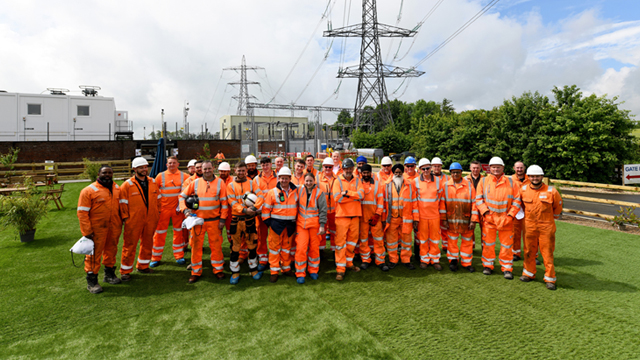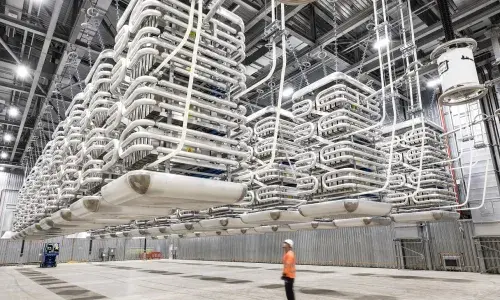
National Grid releases findings of its ‘ground-breaking’ Health Hub
Tackling mental health one site at a time
-
Sickness rate of one per cent, compared to 2.6 per cent standard across industry
-
Two thirds acknowledged that the facilities helped to make their lives easier
-
Self-employed and supervisors suffer greater feelings of loneliness, and higher depression scores.
National Grid has today released the findings of its Health Hub initiative at the IFA interconnector in Sellindge. A year after its launch, in collaboration with The University of Warwick, the initiative has identified significantly lower anxiety levels associated with facility use.
Data from Office National Statistics (ONS) reveals that workers in the construction industry are four times more likely to take their own lives, compared to other sectors. Research indicates that 90% of workers in the construction industry have felt overwhelmed and 26% experienced suicidal thoughts. Health Hub was designed to change that and to provide a working example of the tools and measures required to make a difference – providing a lasting legacy of knowledge for future projects and wider industry.
Of the 107 participants in the initiative, two thirds acknowledged that the facilities helped to make their lives easier, indicating lower anxiety levels with increased use. Participants cited the facilities as ‘unheard of, for this industry and ‘about time’ while another said, ‘I do feel it benefits everyone’. Facilities included a gym, canteen, outdoor social space, and TV room, with over half admitting that they would like to see similar facilities on future projects.
Of those facilities provided, the canteen was the most used, ensuring food was available 24/7 to meet the needs of all shift workers; the TV room and outdoor social spaces were also popular.
When asked about challenges they face at work, participants highlighted work-life balance and being away from families as key factors in their wellbeing. The study also revealed that participants who were self-employed (70 per cent of the total) and supervisors (12 per cent of the total) reported significantly greater feelings of loneliness, and supervisors had higher depression scores.
Anecdotally, workers said that the social spaces boosted morale on site and the hub was seen as a sign of appreciation and well received.
Emma Ford, Construction Director for the IFA project and Health Hub business sponsor at National Grid, said: “As a business, we pride ourselves on the health and wellbeing programmes we provide for our people. The Health Hub was designed to not only support the team on this job, but to engender a change of mindset for everyone involved and life beyond IFA. We will continue to develop this vital research, sharing best practice across our business and industry through the Health Hub Consortium, with the core aim of creating a minimum wellbeing standard for all construction.”
In the latest research from Business In The Community (BITC)[1], it's estimated that the cost from poor health due to absenteeism, attrition and presenteeism amongst UK employees is up to £150bn per year, or up to £5,000 per employee. However, the benefits of an improved workforce are estimated to be the region of £4,000-£7,000 per employee.
Emma Ford continued: “We already know that by helping people to thrive, there is a reduction in absenteeism, increased productivity and improved mental health and that brings a monetary value. If businesses can see what they can gain from the implementation of health and wellbeing programmes, then that’s a positive change for the better.”
Alongside the innovative Health Hub, research partners at The University of Warwick conducted an in-depth analysis of the challenges faced by the workers. Participants described the vicious cycle of knock-on effects of long working hours on their physical and mental wellbeing and family life, as well as the stigma surrounding mental health.
Associate Professor Carla Toro, Warwick Medical School, University of Warwick, said: “It was a privilege to work with National Grid on this important project. There is a large research gap on what helps to improve the mental wellbeing of construction workers. As a step beyond the is straditional organisation-wide approach to wellbeing, National Grid have introduced an inclusive model (the Health Hub), that makes wellbeing support available for all construction workers from multiple organisations from all sizes, including MSMEs and sole-traders.
“Our research findings from the National Grid and Warwick collaboration provide the first insights to what we hope will become a minimum standard to support and improve the wellbeing of construction workers at all construction sites.”
National Grid worked with WMG at the University of Warwick to research the experiences of construction workers using the Health Hub, and the benefits these additional services had on employee mental wellbeing. The project is being led by Dr Carla Toro, Associate Professor in Digital Healthcare Sciences at WMG.
Health Hub is a first-of-its-kind approach for the construction industry, offering a fully equipped on-site wellbeing centre 24/7 throughout the life of the construction project.
Health Hub has been shortlisted for four industry awards to date, and has this month won the Construction News Health, Safety & Wellbeing Excellence award.
[1] Prioritise People: unlock the value of a thriving workforce - Business in the Community (bitc.org.uk)



